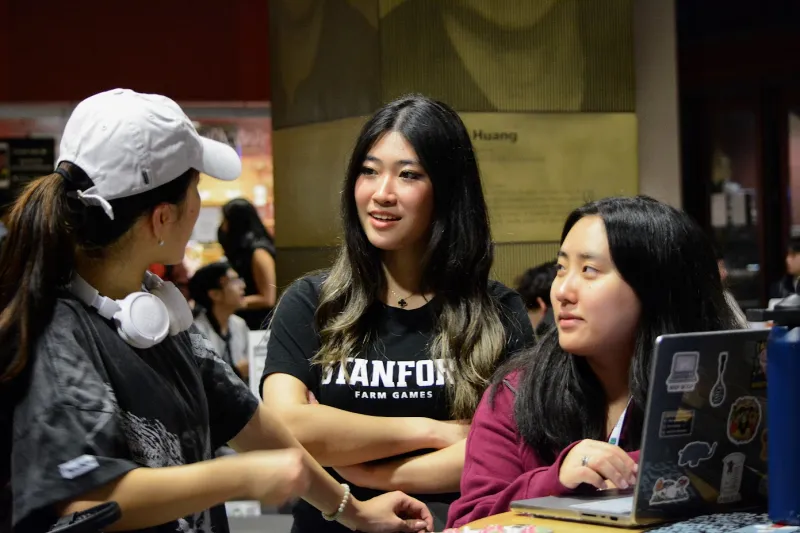TreeHacks 2024, the 10th edition of Stanford’s self-identified “premier” hackathon, brought together innovators from across the globe for 36 hours of collaboration and creativity over the weekend of Feb. 16 to 18. Hundreds of engineers teamed up to collaborate on rapid engineering projects and compete for over $130,000 in prizes.
TreeHacks, which began in 2014, has become a central campus platform for innovation and connection. Students often stay awake for the full 36 hours, due to a schedule packed with events like speaker events with tech CEOs, sunrise hikes and laughter yoga.
Among the myriad of projects, two teams — Baymax and VR-Tines — stood out to judges for products that showcased the intersection of innovation and empathy.
Baymax aimed to revolutionize the lives of individuals facing mobility limitations, according to developers Aarav Wattal ’27, Krish Parikh ’27, James Chen ’27 and Jay Khemchandani ’27. The project, a computer vision-enabled robotic arm, drew attention for its potential to assist those with visual impairment, paralysis and Parkinson’s disease.
“40 million people in the world are blind. Half a million people suffer potentially paralyzing spinal cord injuries every year, and 8.5 million people are affected by Parkinson’s and the pervasive difficulty for these individuals to interact with objects in their environment,” Khemchandani said. “Often, they need to stay in a nursing home or hire personal care.”
But, Khemchandani said, many people are not able to afford such care — something the team found “unacceptable given the capabilities of today’s technology.”
The solution they proposed was a robotic arm that could identify any object, pick it up, manipulate it and have enough dexterity to track a user’s face and mouth and feed them “in a humane manner,” Chen said.
“We envisioned Baymax as a helping hand for the visually impaired, elderly and paralyzed,” he said.
The Baymax team won the prestigious Moonshot Grand Prize, which celebrates the “craziest, most out-of-this-world project,” according to the TreeHacks website. On top of the $10,000 associated with the Moonshot prize, Wattal said the team also won round-trip plane tickets to Japan.
The VR-Tines team, comprised of Kimberly May ’27, Jenny Huynh ’27 and Princeton students Jenny Sun and Chrissy Sun, tackled the issue of isolation during hackathons. Developers said their project aimed to bridge the gap between physical separation and emotional closeness by creating a shared virtual space for real-time interaction.
“VR-Tines is our answer to the challenge of being isolated from loved ones during hackathons,” Jenny Sun said.
The project name was a play on “Valentine’s Day,” said Chrissy Sun, in honor of the holiday weekend. “We ultimately just want to create an immersive environment where you can interact in real time to bridge the distance and feel closer.”
Beyond the accolades, both teams shared a common commitment to leveraging technology for positive change.
“Our goal is to create solutions that have a tangible impact on people’s lives,” said Khemchandani.
This article has been updated to correct the name of the VR-Tines app. The Daily regrets this error.
